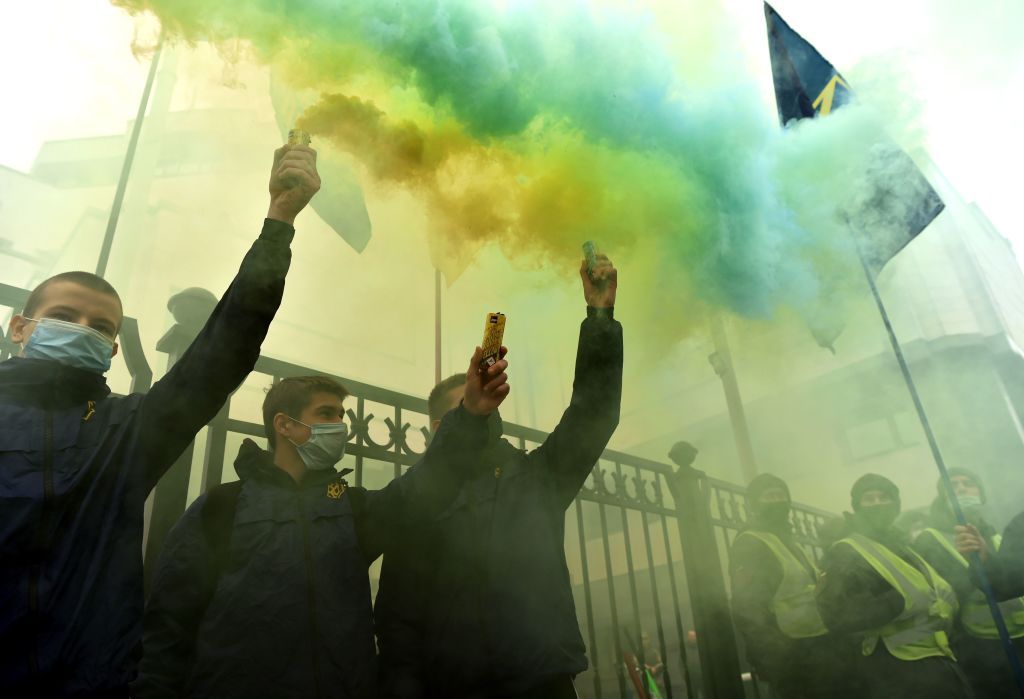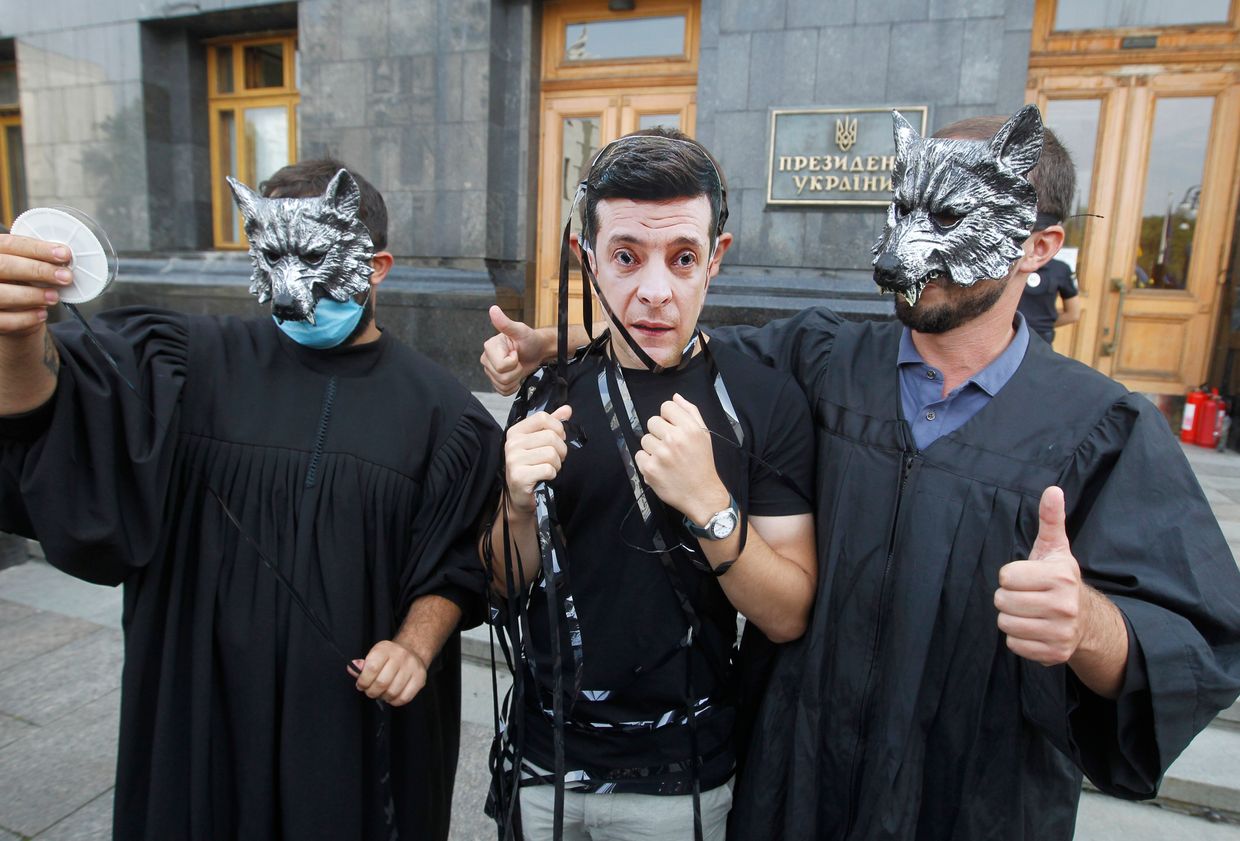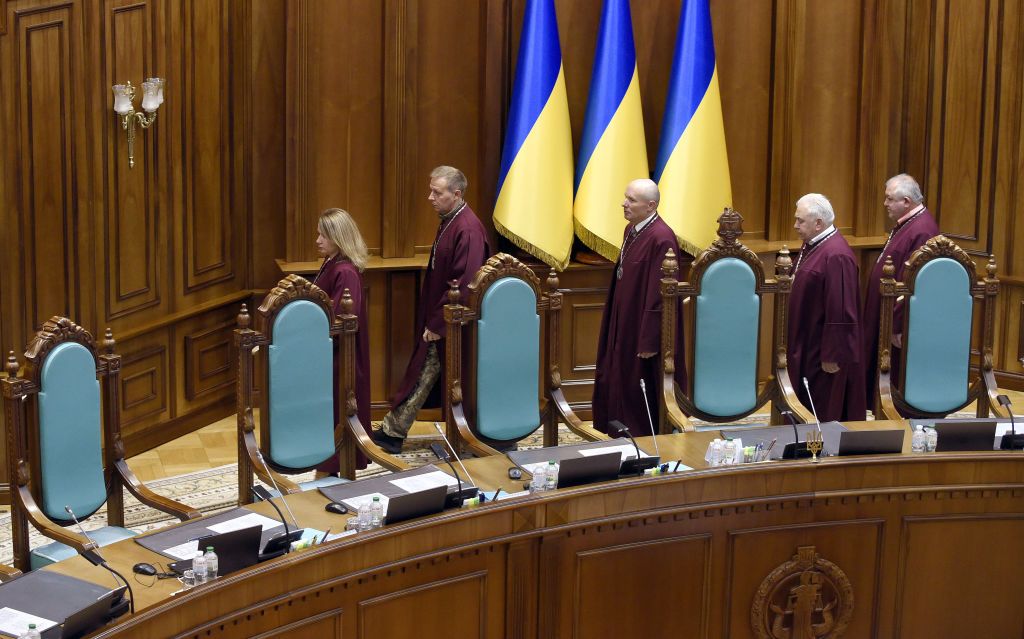Intelligence service claims top judicial official has Russian citizenship; he denies it, cites pressure

Ukraine's Foreign Intelligence Service has alleged that Roman Ihnatov, head of the High Qualification Commission, a key agency in Ukraine's judicial system, has Russian citizenship.
Ihnatov, who worked as an investigator in Russia in the 1990s and was required by the law to be a Russian citizen at the time, denies having ever had Russian citizenship.
The claim has also been disputed by journalists from Radio Free Europe/Radio Liberty's Schemes investigative journalism project, known to have uncovered the Russian passports of Ukrainian judges before. The journalists say that it appears that Ihnatov has no valid Russian passport, since it can't be found in Russian databases, and that the number of the alleged passport, provided by the Foreign Intelligence Service, is likely fake.
The Foreign Intelligence Service declined to comment on the issue.
The agency revealed Ihnatov's alleged Russian citizenship in a letter sent to the High Qualification Commission, a judicial body that vets and nominates candidates for judicial jobs. The contents of the letter were leaked to the press on Dec. 21.
If the information on his alleged Russian citizenship is found to be true, Ihnatov would lose his job as the head of the commission. Ukrainian law explicitly bans people with foreign citizenship from holding state jobs.
Amid Russia's full-scale invasion of Ukraine, scandals about the Russian citizenship of judges and officials and their potential links to Russian intelligence agencies have intensified. In 2022, Bohdan Lvov, the deputy head of the Supreme Court, was fired after the Security Service of Ukraine confirmed that he was a Russian citizen.
If Ihnatov is proved to hold Russian citizenship, it would also be a concerning sign for Ukraine's recent judicial reform. Ihnatov's appointment as head of the commission to vet judges in June was part of the reform.
Ihnatov said that the accusation is part of an effort to put pressure on him, and hinted it was coming from the judges the commission was vetting.
He also revealed that he was facing accusations of treason in a separate case, which he also believes is part of the pressure campaign.
Russian citizenship
A person whose full name and date of birth fully coincide with Ihnatov's has a valid Russian passport, the Foreign Intelligence Service said in a letter leaked to online newspaper Dzerkalo Tyzhnya.
According to the passport, Ihnatov is allegedly registered in the city of Petrozavodsk in the Russian republic of Karelia. The letter added that the intelligence service can't request information from the relevant Russian agencies to confirm Ihnatov's Russian citizenship due to the war and the termination of diplomatic relations between the two countries.
The High Qualification Commission reacted by saying it is trying to confirm the news.
"The High Qualification Commission firmly believes that judges and judicial officials must not have the citizenship of other states, including the aggressor country," the commission said in a statement on Dec. 21. "Due to the publication of the information that the head of the commission may have Russian citizenship and the information sent from relevant government agencies, the commission deems it necessary to send relevant requests to confirm or refute the information published."
According to his official biography, Ihnatov was an investigator at the prosecutor's office in Petrozavodsk in 1995-1996.
Under the Russian law valid at the time, prosecutor's office investigators were required to have Russian citizenship.
However, Ihnatov has claimed that he did not acquire Russian citizenship when he lived and worked in Russia. He also claimed that he was stateless at that time.
"At the time, I had a Soviet passport in which there was no stamp about Russian or Ukrainian citizenship," Ihnatov said on Dec. 21. "I was stateless until 1997. I have all the documents confirming this."
The High Qualification Commission did not respond to repeated requests for comment by email and phone.
He was also a prosecutor in Ukraine's Luhansk Oblast in 1996-2003 and a Ukrainian judge since 2003.
Natalia Sedletska, head of the Kyiv bureau of RFE/RL, said on Dec. 21 that the media outlet had checked Russian databases for traces of Ihnatov's passport earlier in 2023, when rumors of his alleged Russian citizenship first appeared online. The journalists couldn't find Ihnatov there.
Sedletska pointed out that the number of Ihnatov's alleged Russian passport, provided by the Foreign Intelligence Service, is a combination of his Soviet passport's number and its issue date, which means it cannot be a currently valid Russian passport.
It is not clear if the Foreign Intelligence Service made a mistake and was referring to his Soviet passport.
After the collapse of the Soviet Union, Soviet citizens who lived in Russia automatically became Russian nationals, and Russian citizenship stamps were put in their Soviet passports until they received Russian ones. If Ihnatov complied with the Russian law on law enforcement agencies, a Russian citizenship stamp could have been inserted in his Soviet passport.
Treason case and pressure allegations
Ihnatov also said at the briefing that the State Investigation Bureau had opened a treason case against him in September in connection with the circumstances of his visit to Russian-occupied Luhansk in November 2014. He denied any wrongdoing.
The bureau did not respond to a request for comment.
In November 2014 Ihnatov went from Kyiv, where he worked as a judge, to Luhansk. He was detained by Russian proxies and later released.
He claimed later that he had gone to Luhansk to visit his mother and an acquaintance helped him get released.
Ihnatov argued that the criminal case and the publication of information on his citizenship were a response to his performance as head of the commission and his efforts to vet judges.
The High Qualification Commission initiated the firing of some tainted judges earlier in December but it has also been criticized for green-lighting other tainted judges.
"There is also information that provocations and pressure on other members of the commission are being prepared," Ihnatov said.
He also said that he had reasons to fear for his safety. He added he would not leave the High Qualification Commission building for the time being and asked for state-provided security guards.
If Ihnatov's Russian citizenship proves to be real, it would put in question the quality of Ukraine’s recent judicial reform. The reform was formally completed in June, and Ihnatov was appointed. Before the appointment, he was supposed to undergo a rigorous vetting, which was supposed to reveal a foreign citizenship if he had one.
According to the concept of the reform, new members of the High Qualification Commission and High Council of Justice are supposed to be honest, independent, and professional. They must bring fundamental change to the judiciary.
But critics argue that most independent and reformist candidates for the two bodies have been rejected, while at least several tainted candidates have still managed to get top judicial jobs.
Judicial expert Halia Chyzhyk believes that the best candidates were rejected, and those who got the top judicial jobs are little-known and there is no information on their achievements.
Hello! My name is Oleg Sukhov, the guy who wrote this piece for you.
I was born in Russia and moved to Ukraine in 2014 because I couldn't stand the suffocating atmosphere of that semi-totalitarian country. I used to think it might be possible to transform Russia into a liberal Western-oriented country. Now it's clear that it's a lost cause. But at least I can atone for the crimes of my homeland by exposing its barbaric aggression against Ukraine and providing objective and independent coverage of what is going on there. I'm also trying to contribute to Ukraine's transformation into a full-fledged Western liberal democracy strong enough to defeat Russia.
Our publication needs help from every one of you — support Ukrainian wartime journalism, become a patron of the Kyiv Independent.













